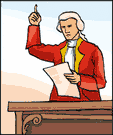I had my feathers slightly ruffled over the weekend – I found myself passionately defending a point of view to a sceptical disbeliever only to be told
“The object of oratory alone is not truth, but persuasion!” Thomas Babington Macaulay, Essay on Athenian Orators
As I had been defending my position with an artillery of facts and figures, and the main thrust of my argument was rhetorical rather than oratory I was ruffled, to say the least. Not solely because my detractor had confused oratory with rhetoric, but that he had so badly misused Thomas Babington Macaulay’s quotation!
I was so seriously displeased that I did what I have always taught my children not to do – when someone thinks that they have slain you with an appropriate quotation, it is considered discourteous to cap it – but I was so put out that I forgot my manners and snapped back with:
The Orator persuades and carries all with him, he knows not how; the Rhetorician can prove that he ought to have persuaded and carried all with him.” – Thomas Carlyle, Essays—Characteristics
…because if you are going to cap Macaulay, who better than Thomas Carlyle? I then completed my rather childish outburst by flouncing off in a huff!!
An hour or so of quiet reflection has made me see the error of my ways, and as I spent that hour or so with a rather delightful old book by John Rigg entitled Platform Oratory and Debate (1929) – I feel I am in a better frame of mind to consider the differences between oration and rhetoric – and of course how that fits into what is now called public speaking.
When we discuss public speaking in our workshops, we point out that it has changed from the stylised platform performances of the past. The days of declamation, verbosity and pomposity are gone forever – (except for some appallingly bad ‘B’ films).
But the basic usage of oration to engage emotion, and rhetoric to exercise the mind is still as important today as it was in the days of Cicero and Pliny.
Cicero himself knew that oration was, at its heart, a devise which could easily be misused. Appealing, as it does, to the emotions it can effectively be used to sway people to act against their instinctive standards – Hitler knew that and used it.
But anyone can used the stylised effective manner of oration to disguise the lack of real substance in their speech…
Orators are most vehement when they have the weakest cause, as men get on horseback when they cannot walk. – Cicero (Marcus Tullius Cicero).
On the other hand, rhetoric is based on logical thinking, and therefore was used by the ancients as a balance to that florid emotional appeal – hence my reference to Carlyle. An excellent orator himself; he knew that an emotional appeal may carry all before; but he also realised that people who wake up to the device can feel cheated if they cannot then find the evidence to support their emotional response.
Pliny did not consider himself an orator, he preferred to be considered a practiser of Rhetoric but he was well aware of the power of the emotional devices used by orators…
“Besides, as is usually the case, we are much more affected by the words which we hear, for though what you read in books may be more pointed, yet there is something in the voice, the look, the carriage, and even the gesture of the speaker, that makes a deeper impression upon the mind.” Pliny the Younger (Caius Caecilius Secundus),- Epistles (II, 3)
Rhetoric, on the other hand, while using the best language, does so to establish the facts of the situation. A Rhetorician argues a case based on evidence, using the principles of good speech to create a well rounded appeal both to the mind and to the senses.
Therefore in teaching the art of public speaking today, we should know our orators and our rhetoricians; and we need to be aware of the need for both in our speeches or public pronouncements today. The art of modern public speaking is that balance between intellectual and emotional input; convincing by evidence and persuading by emotion.
Which is why my feathers were ruffled … I had marshalled an arsenal of facts and figures to my defence; I was well versed in the evidence of my opinion and I conveyed it with all the passion of conviction at my command – and I have a fair bit!
To then be mistakenly dismissed as merely a rotundate orator was gall to my soul!! So I shall end with an appeal to that most English of orators Samuel Johnson…
“Upon men intent only upon truth, the arm of an orator has little power; a credible testimony, or a cogent argument, will overcome all the art of modulation, and all the violence of contortion.” – Johnson: Idler #90 (January 5, 1760)
… so there!!
Michele @ Trischel

